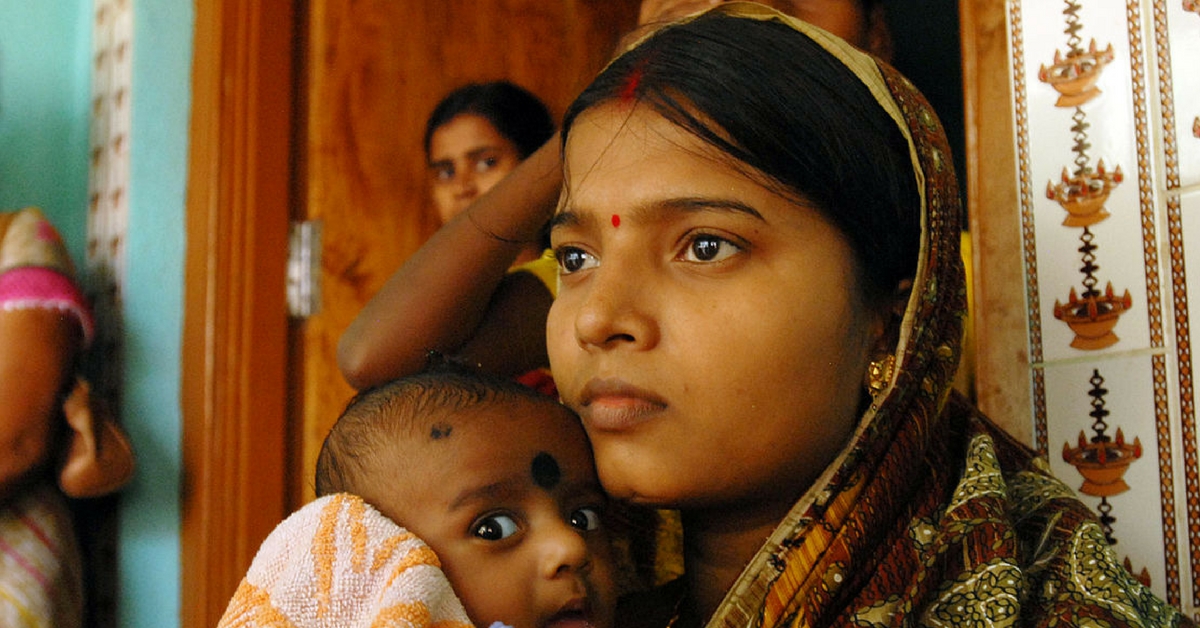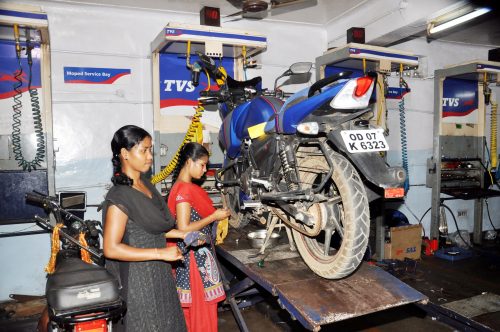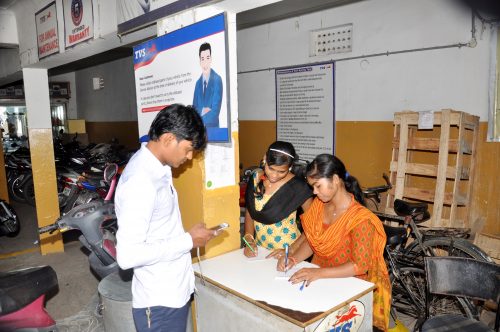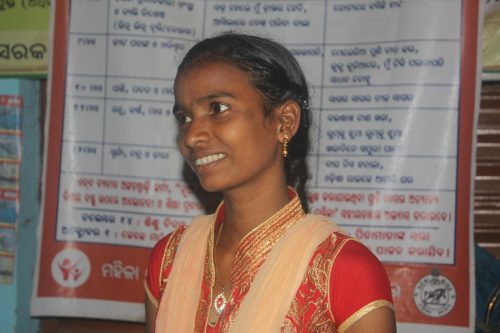TBI Blogs: Meet Odisha’s New Generation of Young Tribal Women: Trained, Ambitious, Fearless
Intervention by government and private agencies is heralding socio-cultural change in the hinterlands of Odisha. A look at how awareness building and training initiatives are changing the lives of girls and young women in the area.

Intervention by government and private agencies is heralding socio-cultural change in the hinterlands of Odisha. A look at how awareness building and training initiatives are changing the lives of girls and young women in the area.
It is not every day that one sees girls training to become mechanics. But 16 teenage girls from Odisha’s far-flung Gajapati district came out recently to take the training in Berhampur, located more than 100 km. from their remote villages. “I was excited to get this opportunity, and I am happy that I was able to complete the four-month course,” shares Subarni Paikaray, a delighted 19-year-old from Gumma block. Subarni, as well as the other girls training with her, had been unable to pursue their studies any further, but they were happy that they had been selected for vocational training under a programme for empowerment of adolescent girls being implemented in the district. Now, they are preparing to be placed at service centres and showrooms around Gajapati and its nearby districts.
Likewise, Mamata Barik, 20, from Koraput district, has just finished a course in sales. “I had passed my Class X exams but could not continue my studies. My parents wanted me to get married. But I was lucky to come across this kind of training made available for rural youth. I could not let this opportunity pass,” says Mamata, who has received training under the Deen Dayal Upadhyaya Grameen Kaushalya Yojana (DDU-GKY), a placement-linked government employment scheme for rural poor youth. The Roshni initiative under the DDU-GKY is especially designed for young people hailing from extremist-violence-affected districts such as Koraput, Rayagada, Kandhamal, and Malkangiri. Here, at least 40% of the total candidates are required to be women, especially those belonging to Particularly Vulnerable Tribal Groups (PVTGs).
Mamata is now working as a confident sales girl in a garment shop in Jeypore in Koraput, earning a well-deserved Rs. 4,500 every month.

Several young women like Subarni and Mamata are getting trained in various skill development courses. This delays their age of marriage, resulting in long-term health and social benefits, apart from enhancing their livelihood opportunities. In Gajapati district, for example, 40% of currently married women aged 20-24 years were married before the age of 18 (Annual Health Survey, 2012-13). The rate of pregnancy and motherhood among 15-19 year-old married adolescent girls was reported to be as high as 48.5%. In addition, approximately one out of seven (13.4%) girls are school dropouts in the 6-17 year age-group, and this increases to one in three in the 13-17 year age bracket.
Girls, including adolescents, are among the most vulnerable and marginalised, especially in rural and tribal societies. “They need age-appropriate information and services to beat the multiple challenges brought on by structural poverty, the lack of information and opportunities, regressive socio-cultural norms like early marriage, and sub-par education,” states Dr. Deepa Prasad, Programme Coordinator, UNFPA-Odisha. In fact, vocational training is an important component under a UNFPA project on empowerment of adolescent girls in Gajapati. Under this, the girls have learnt different employable skills such as motor mechanics, basic computers and office management, tailoring, and nursing, largely through linkages with skill development institutes and programmes.
Early marriage, teen pregnancy, and discontinued schooling are some of the major concerns of girls and young women in the tribal districts. Marriage seems to be the only option for girls who drop out of schools or are unable to continue their studies after passing out from school. In many instances, parents have to be counselled and educated regarding opportunities for skill development and benefits for girls through community sensitisation meetings.
A database created in collaboration between private and government implementing agencies helps in identifying potential girls who have dropped out and are in need of such training.

Post-training, several young women have either been self-employed or have been employed by private agencies both within and outside the state. “I was happy when my daughter Pinki took a three-month tailoring course. However, my husband and I were quite apprehensive when she got a job in a garment factory in Bangalore and wanted to join there,” says Nandini Bisoyi from Gaiba village in Gajapati. Pinki, 19, however, convinced her parents to let her go, and today she stays in an accommodation provided by her employers. She is in regular touch with her parents which has assuaged their concerns. “We felt very proud when she sent Rs. 18,000 after working for only a couple of months,” says a visibly elated Nandini.
Increased opportunities for income generation is obviously helping in improving the status of girls in these areas. “I am able to support myself and my family with my earnings from tailoring. I feel both proud and useful,” says Anmita Raita, 18, who earns more than Rs. 5,000 per month after undertaking a one-month course. She was supported with a sewing machine by the NGO People’s Rural Education Movement (PREM) through its programme which facilitates vocational and professional training for adolescent girls and women in underdeveloped Gram Panchayats of Ganjam, Gajapati, Kandhamal, and Puri districts.
PREM’s programmes for young mothers and adolescent girls have benefited 2,110 women and 536 adolescent girls so far.

Kabita Sunani, 22, from Kalahandi district, has been working as a home nurse for the last three years in state capital Bhubaneswar. “I came to know about a non-profit agency that gives free training in home nursing and enrolled for the same,” says Kabita, who makes Rs. 6,000 per month. “Many girls from my district have also taken this course,” she informs.
The growing aspiration of girls and young women from tribal areas points to a gradually changing socio-cultural trend where women no longer want to confine themselves to conventional livelihood sources like agriculture, making sal leaf plates, and bidi rolling. Several skilling centres present within these districts offer a variety of training courses that are popular with the youngsters. The Gram Tarang Employability Training Services is one such organisation that operates in several districts including Keonjhar, Koraput, Rayagada, and Gajapati.
However, one of their biggest challenges continues to be a lack of awareness. Skilling centres and training institutes run by NGOs have to undertake intensive mobilisation and counselling to convince young women and their families. “It is only when we assure them of the safety and security of the girls that parents allow them to undertake the training,” says Sanjukta Tripathy from PREM, adding, “They need additional counselling when they are placed outside the state and have to be relocated.” Some of the jobs require the young women to relocate to states like Karnataka and Andhra Pradesh which is difficult initially for both the girls and their families to accept and adjust.
Vocational training linked with assured placement can be a huge boost for young women from underdeveloped districts of Odisha. Besides offering avenues for income generation, it gives them immense confidence and self-efficacy. There are significant social and health benefits too. In spite of this, more awareness on the ground, counselling for parents and communities, and advocacy for a safe, secure and better environment at the work place is critical.
Subarni, Mamata, Pinky, Anmita, Kabita and others are building a different life, and with talent, agency and confidence, they are making their parents and communities proud.
Like this story? Or have something to share? Write to us: [email protected], or connect with us on Facebook and Twitter.
NEW: Click here to get positive news on WhatsApp!
If you found our stories insightful, informative, or even just enjoyable, we invite you to consider making a voluntary payment to support the work we do at The Better India. Your contribution helps us continue producing quality content that educates, inspires, and drives positive change.
Choose one of the payment options below for your contribution-
By paying for the stories you value, you directly contribute to sustaining our efforts focused on making a difference in the world. Together, let’s ensure that impactful stories continue to be told and shared, enriching lives and communities alike.
Thank you for your support. Here are some frequently asked questions you might find helpful to know why you are contributing?


This story made me
-
97
-
121
-
89
-
167













